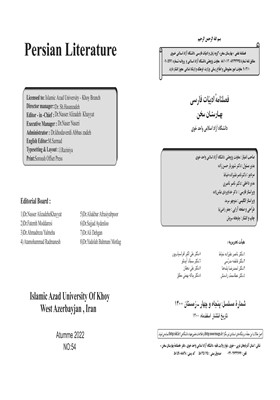Conceptual Studying and Analyzing of Irony in the " Rozeh of Khold " from Majd Khafi
Subject Areas : Abstract ArticlesMina Taymuri Khosrowshahi 1 , Jalil Amirpour Dariani 2 * , Nasser Nasseri 3
1 - Ph, D. student Department of Persian language and literature , Shabestar branch, Islamic Azad University , Shabestar, Iran.
2 - Assistant professor Department of Persian language and literature, Shabestar branch, Islamic Azad University , Shabestar, Iran.
3 - Assistant professor Department of Persian language and literature , khoy branch, Islamic Azad University , khoy, Iran.
Keywords: stories, Keywords: irony, Majd Khafi, The Rozeh of Khold,
Abstract :
Abstract Satire and satirizing is one of the artistic and effective methods and is of the critical and social subdivisions of literature which is used to protest the abnormalities of the society in different ways. The Rozeh of Khold is a book which has been written in imitation of The Golestan of Sa'di which sometimes has transferred its didactic teachings to its readers. We have tried, in this essay, by an analytic-descriptive approach, to study the satires in this book. Majd Khafi has been able to use the satiric tools such as sarcasm, allusion, ridicule, inversion, simulation of man as animal, pretension to stupidity, to use his critical tenets in the cultural, social, political, religious, didactic and ethical mold which are dominant in satirical stories. His language is simple and far from harshness. It must be said that satire in his speech is conceptually understandable; because he has tried to use fewer words and pay attention mostly to the rhetorical functions.
فهرست منابع و مآخذ
الف: کتابنامه
1- آرینپور، یحیی، (1375)، از صبا تا نیما، ج 2، تهران: زوار.
2- اصلانی، محمّدرضا، (1387)، فرهنگ واژگان و اصطلاحات طنز، تهران: کاروان، چاپ دوم.
3- پلارد، آرتور، (1386)، طنز، ترجمة سعید سعیدپور، تهران: مهر ویستا.
4- تنکابنی، فریدون، (1357)، اندیشه و کلیشه، تهران: جهان کتاب، چاپ اوّل.
5- جوادی، حسن، (1384)، تاریخ طنز در ادبیّات فارسی، تهران: کاروان، چاپ اوّل.
6- حلبی، علی اصغر، (1364)، مقدّمهای بر طنز وشوخ طبعی در ایران، تهران: پیک، چاپ اوّل.
7- خوافی، مجد، (1389)، روضه خلد، با مقدّمه، تصحیح تعلیق عبّاسعلی وفایی، تهران: سخن.
8- شفیعی کدکنی، محمّدرضا، (1385)، این کیمیای هستی، تبریز: آیدین، چاپ اوّل.
9- صلاحی، عمران، (1356)، طنزآوران امروز ایران، تهران: مروارید، چاپ دوم.
10- عبید زاکانی، نظامالدّین، (1379)، کلیّات، به تصحیح پرویز اتابکی، تهران: زوّار، چاپ اوّل.
11- نیکوبخت، ناصر، (1380)، هجو در شعر فارسی، تهران: دانشگاه تهران، چاپ اوّل.
ب- مقالات
12- آقایی چاووشی، لیلا، (1396)، «جستاری در شگرد طنز و انواع آن در مقالات شمس»، فصلنامة علوم ادبی، سال 7، شمارة 11، صص: 9-28.
13- احمدوند، عبّاس؛ زهیر صیامیان گرجی و فاطمه کارگر جهرمی، (1395)، «طنزپردازان و شیوههای طنزپردازی در ایران عصر سلجوقیان»، مطالعه تاریخ فرهنگی، پژوهشنامة انجمن ایرانی تاریخ، سال هشتم، شمارة 29، صص: 23-48.
14- بلوری، مریم، (1393)، «نقد و بررسی طنزهای سیاسی در متون نظم و نثر فارسی سدههای چهارم تا هشتم هجری»، نشریه ادب و زبان دانشگاه شهید باهنر کرمان، سال 17، شمارة 36، صص: 114- 134.
15- بهرهمند، زهرا، (1389)، «آیرونی و تفاوت آن با طنز و صنایع بلاغی مشابه»، تهران: دانشگاه علاّمه طباطبایی، فصلنامه زبان و ادبیّات پارسی، شمارة 45، صص: 9- 36.
16- چناری، عبدالامیر، (1384)، «طنز در شعر حافظ»، تهران: پژوهشنامة علوم انسانی، شمارة 45- 46، صص: 39-52.
17- حسامپور، سعید و جواد دهقانیان و صدیقه خاوری (1390)، «بررسی تکنیکهای طنز و مطایبه در آثار هوشنگ مرادی کرمانی»، مجلّة ادبیّات کودک، سال 2، شمارة 1، صص: 61-90.
18- شیری، قهرمان، (1376)، «راز طنزآوری»، فصلنامة پژوهش و سنجش، شمارههای 13- 14، صص: 205- 216.
19- طالبیان، یحیی و تسلیم جهرمی، فاطمه، (1388)، «ویژگیهای طنز و مطایبه در کاریکلماتورها»، فنون ادبی، دانشگاه اصفهان، شمارة 1، سال اوّل، صص: 13-40.
_||_
